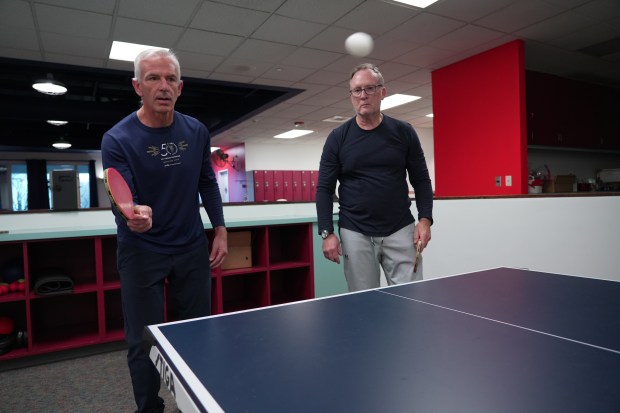Ping pong has been a popular activity for generations with tables often found in family basements, dormitories and recreation halls. Now some Parkinson’s disease patients are using the sport to gain both physical and emotional benefits while having some fun along the way.
The familiar sounds of a paddle striking a hollow white ball can now be heard at the Northwestern Medicine Lake Forest Hospital’s Health and Fitness Center. Right after the first of the year, the hospital launched the twice-weekly therapy through its Parkinson’s disease program seeking to provide some resistance to those living with the neurological disorder. Approximately 500,000 Americans live with the disease and 50,000 are diagnosed with Parkinson’s disease yearly.
“We want to empower, support and encourage people with Parkinson’s to live their best life,” Program Coordinator Linda Egan explained. “We are always trying to think of innovative programming to give them socialization. That is so important because Parkinson’s can be such an isolated disease so we really want to have group activities.”
Hospital officials believe patients can get some assistance from ping pong. The National Institute of Health offered a similar conclusion in a study.
“A table tennis exercise program is relatively safe and may improve activities of daily living and motor symptoms in patients with Parkinson’s disease,” according to the NIH statement.
With exercise physiologists providing Parkinson’s-specific training, the players start with a warmup session with individual drills such as walking or taking lateral steps while bouncing the ball on one of five tables set up at a wellness center. Soon they move on to drills with partner such as counting the number of times the ball is hit. Then just to paddle up everyone’s competitive juices, the second hour often features games between the participants.
The introduction of table tennis of was the idea of Winnetka’s Mike DeBartolo, 62, who created the Parkinson’s Players program at the Northwestern Medicine network when he started experiencing Parkinson’s-related symptoms about 12 years ago.
The Parkinson’s patients were already playing golf and tennis through DeBartolo’s initiative. Now ping pong supplies an indoor option.
“Ping pong isn’t completely stationary, you have to move your feet a little bit,” he said. “It is one part exercise but it is cognitive too but you have to make relatively quick decisions with your mind where you are going to put your hand.”
Besides the physical benefits, DeBartolo speaks of the psychological advantages available to him and the roughly 40 others who are now playing ping pong at Lake Forest Hospital.
“It shows us that we are not alone. There is empathy and people understand. The disease comes with different levels of difficulty in terms of coordination and slowing us down and the symptoms are varied,” he said. “At the base, we all have Parkinson’s and we can all relate to each of us are going through. There is a community and natural friendship aspect making to that as the people you are meeting in the program are facing the same disease you are.”
One of the other participants is Grayslake’s John Guziec, 77, who was hitting the ball around on a recent Thursday afternoon.
“I like the interaction I have with the people,” Guziec said. “I enjoy the socialization. With the Parkinson’s progressing, the more I walk, the better I feel in terms of balance. The more I do stuff like lifting weights or playing active sports like (ping pong) it keeps me in better shape. I think it is helping me a lot.”
Daniel I. Dorfman is a freelance reporter with Pioneer Press.





